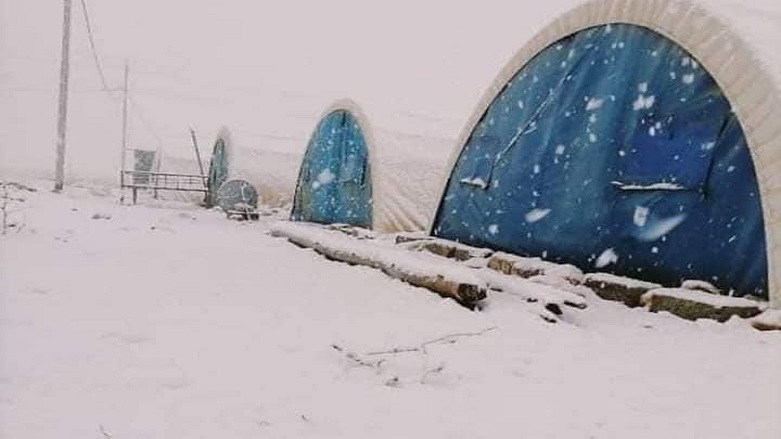Yezidis protest Iraq’s decision to cut off aid to displacement camp

ERBIL (Kurdistan 24) – Displaced members of the Yezidi (Ezidi) religious minority, now living in a camp located at Sinjar (Shingal) Mountain on Thursday, protested against the Iraqi government's suspension of aid to the facility.
The demonstration that took place at Sardasht Camp on Thursday came amid heavy snowfall and freezing temperatures, as well as an acute shortage of cooking and heating fuel inside the camp.
The emergence of the Islamic State and its violent 2014 assault on Shingal led to the displacement of hundreds of thousands of Ezidis, whom the extremist group considers heretics. Most of them fled to the Kurdistan Region, while others resettled in neighboring countries in the region or Western states.
Others were not as lucky and remained stranded in the war zone, where they experienced atrocities and mass executions at the hands of the Islamic State for years. Militants subjected women and girls to sexual slavery, kidnapped children, forced religious conversions, executed scores of men, and abused, sold, and trafficked women across areas they controlled in Iraq and Syria.
"Our area lacks services and our homes are destroyed so we cannot return and the government has stopped its aid to the camp," said Ilyas Khadr Barakat, who has lived there for more than six years.
"I swear that there are families who have been unable to light heaters for days due to the lack of oil. Our children cannot sleep at night in the extreme cold. There will be a disaster if the government does not address our problems," he added.
Iraq's Minister of Migration and Displacement decided during her visit to the camp last year to stop aid to the camp as part of a plan to close all its displacement camps, in part by, in effect, forcing residents to return to their areas of origin after they have repeatedly said they feel unsafe doing so.
Sardasht Camp Director Ali Shaabo said, "The government has stopped its aid to camp residents more than two months ago and now they don't consider the people who are still living in the camp as displaced persons."
The camp was constructed in 2014 to include 2,300 tents. There are currently 3,300 internally displaced persons (IDPs) who escaped from the Islamic currently living there.
"These people are unable to return to their areas because of the destruction that occurred during the time that ISIS controlled the city," Shaabo added.
A local official told local media on Thursday that the Iraqi federal government plans to return the remains of more than 100 victims of the Islamic State that were killed when the extremist group overran Shingal.
Read More: Iraq will return remains of over 100 Yezidis killed by ISIS to Sinjar: Official
Editing by John J. Catherine
